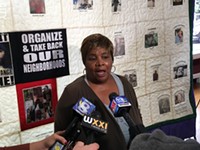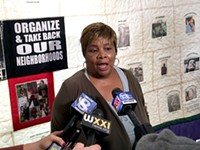[
{
"name": "500x250 Ad",
"insertPoint": "5",
"component": "15667920",
"parentWrapperClass": "",
"requiredCountToDisplay": "1"
}
]
Since 2000 there have been nearly 3,000 shootings in Rochester, resulting in about 3,655 shooting victims. And only 20 percent of the shootings resulted in an arrest, according to police records.
Rochester's shooting rate is not dramatically different from other cities, says Irshad Altheimer, director of the Rochester Institute of Technology's Center for Public Safety Initiatives. What is different about Rochester, however, is that its police department has been collecting comprehensive data about each shooting for several years, Altheimer says. And it has led to some important revelations.
For instance, about 60 percent of shootings that took place in Rochester from 2010 through 2013 involved retaliation and was linked to a dispute. Given the need to stop gun violence in many US cities, including Rochester, a big question, Altheimer says, is whether it's possible to determine which gunshot victims are at higher risk of becoming shooters themselves. And, he says, whether it's possible to stop that person from escalating the violence by retaliating.
The Center has developed a research program that will launch in January called Community Engagement to Reduce Victimization, to try to tackle retaliatory violence through what Altheimer calls hospital-based intervention.
"We want to focus on trauma-involved care, because we don't often think about these people, shooting victims, as true victims who are suffering," says Altheimer. Once their medical condition is stabilized, they often don't receive any further care, even though they may be experiencing fear, anxiety, anger, and other emotional problems, he says.
And Altheimer doesn't look at the issue only from an academic's perspective. He was a victim of a shooting, as well.
"In 1997, I was coming home from college and I got hit three times," he says. His best friend was killed in the event, and Altheimer was taken to the Seattle Medical Center. After he recovered, he was simply sent home.
"No one ever followed up," he says. "That was it. No one was concerned about what I thought or what I would do next. And 20 years later, it really hasn't changed that much. It's still 'Gauze them up and send them home.'"
Altheimer and his team are working with Pathways to Peace, United Christian Leadership Ministries, and Action for a Better Community on the research program. The team will work with about 30 victims who are admitted to Rochester General Hospital for gunshot, stabbing, and blunt-force trauma. RGH's security will immediately contact Pathways to Peace, and a member of Pathways' response team will be on site within 20 minutes. They will analyze whether the injury was the result of a dispute and whether the conflict has risen to the point where it poses a high risk for retaliation.
The assessment and follow up can take many forms, such as working with the victims, their family members, and their friends to do everything possible to dissuade them from seeking revenge. It could also mean asking the hospital administrators to keep the victim – their patient – in the hospital for a short time until all parties have calmed down. It could even mean moving the victim out of town and into temporary housing until the conflict can be de-escalated.
"We are especially concerned about the victims and their families," says the Reverend Lewis Stewart, leader of United Christian Leadership Ministries, "and we will be concentrating our efforts in helping them through their suffering. This is a time when the family needs to grieve, but they also need hope."
There is a tendency to leave families alone in their grief and allow them to process what has happened, Stewart says.
"This is not the time for them to be alone," Stewart says. "We want to do work similar to the work and the counselling that the Friends and Family of Murdered Children has offered. We'd like to build on this and try to enhance it."
Stewart is especially concerned about young black males, because they are often vulnerable to street violence, and some don't have a positive male role model in their life, Stewart says. If they become a victim or someone they care about is a victim, they don't have a support system to help them through it.
"We need to be there for them," Stewart says. "We need to help them understand that, 'No, this type of thing is not normal, regardless of what community you live in.'" They need to know that retaliation is not going to help anyone, Stewart says.
Programs like RIT's have some serious challenges, though, Altheimer says. In urban communities, as Stewart notes, the victims are often young men of color. And they frequently don't have a favorable view of police or the justice system, so they may be reluctant to seek help.
There are other reasons people hesitate to call or talk to the police when they are a victim of a shooting, Altheimer says.
"Some people actually are criminally involved themselves, so how can they turn to police for some form of dispute resolution for help?" he says. "Others fear that they may be re-victimized or someone in their family will be hurt. And if the status quo is that many shootings don't result in an arrest, why would you call the police, since there is little consequence?"
There is also a strong inclination for everyone involved to pre-judge a young shooting victim.
"Often our first thought is this type of violence doesn't happen to innocent people, so they must have been doing something wrong," he says. "That's not where we want to go with this."
Speaking of...
-

Urban Action 4/10
Apr 10, 2019 -

Calls grow to stop shootings
Oct 3, 2018 -

Religious leaders are called to help end gun violence
Sep 25, 2018 - More »
Latest in News
More by Tim Louis Macaluso
-

RCSD financial crisis builds
Sep 23, 2019 -

RCSD facing spending concerns
Sep 20, 2019 -

Education forum tomorrow night for downtown residents
Sep 17, 2019 - More »






